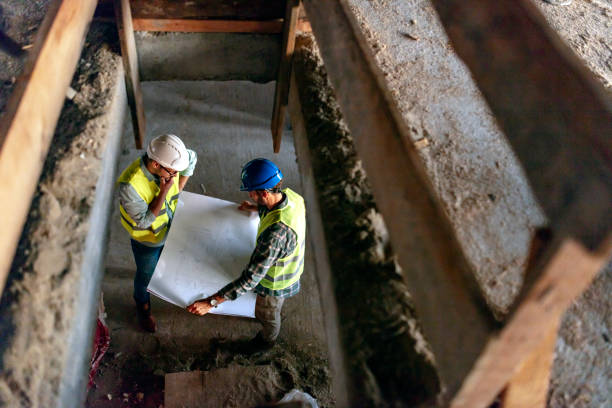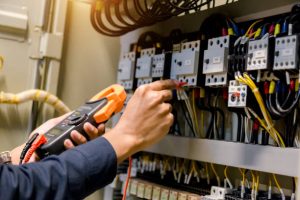Home renovations can be a thrilling journey filled with endless possibilities to transform your living space – and that’s where the electrician comes in! The role of an experienced, qualified electrical specialist is integral for ensuring any home renovation project has safe, reliable wiring. In this blog post, we take you through exactly what goes into ensuring your electrical systems are up-to-code, including explaining the skills and knowledge they bring to the table. Ready? Let’s jump into it.

Pre-renovation planning:
- Meeting with the homeowner and other contractors to discuss the renovation plans and electrical requirements: This step is essential to ensure that the electrician has a clear understanding of the homeowner’s needs and expectations, as well as any specific electrical requirements that may be necessary for the renovation project. The electrician should ask questions about the homeowner’s goals for the renovation, the desired changes to the electrical layout, and any appliances or electrical devices that will be added or upgraded. The electrician should also work with the homeowner to understand any budget constraints or timeline considerations that may impact the electrical work.
- Surveying the home to identify existing electrical systems and any potential issues or upgrades needed: Before beginning the electrical work, the electrician should conduct a thorough survey of the house to determine the existing electrical systems and any potential issues or problems that may need to be addressed. It may include inspecting the electrical panel, wiring, outlets, and fixtures to ensure they are in good condition and up to code. The electrician should also identify any areas of the home that may require additional electrical power or outlets to meet the needs of the renovation.
- Providing input on electrical layouts and design based on code compliance and best practices: Based on the home survey results and the homeowner’s goals for the renovation, the electrician should provide input on the electrical layouts and design for the renovation project. It may include recommendations on the number and placement of outlets and fixtures and any necessary electrical upgrades to the panel or wiring. The electrician should ensure that the electrical layouts comply with local codes and follow best practices for safety and functionality.
- Creating a detailed electrical plan and budget for the renovation project: Once the electrical layouts and design have been finalized, the electrician should make a clear plan for the electrical work that includes a timeline and budget. The goal should outline the tasks that will be completed, the materials and equipment needed, and any subcontractors or assistants that may be required. The electrician should work with the homeowner to ensure that the plan aligns with the overall renovation budget and timeline.

Installation and repairs:
- Installing new electrical wiring, outlets, switches, and fixtures as needed: During the renovation project, the electrician may be responsible for installing new electrical wiring, outlets, buttons, and institutions to meet the renovation needs. It may include running new wires through walls and ceilings, installing outlets and switches, and installing new fixtures such as light fixtures, ceiling fans, and appliances. The electrician should ensure that all installations are done safely and comply with local codes and regulations.
- Upgrading or repairing existing electrical systems to meet the renovation needs: In addition to installing new electrical systems, the electrician may also be responsible for boosting or improving existing systems to meet the renovation needs. It may include replacing outdated wiring or fixtures, repairing damaged electrical components, or upgrading the electrical panel to support additional electrical loads. The electrician should ensure that all repairs and upgrades are done safely and in compliance with local codes and regulations.
- Testing and inspecting the electrical work to ensure it meets code requirements and functions adequately: After completing the electrical work, the electrician should try and review the systems to ensure that they are functioning correctly and meet all code requirements. It may involve using specialized testing equipment to verify that the wiring is properly installed and that outlets and fixtures are functioning correctly. The electrician should also check for potential safety hazards, such as exposed wires or improperly installed outlets, and address them as needed.

Safety and maintenance:
- Ensuring that all electrical work is performed safely and in compliance with local codes and regulations: Safety should be a top priority for the electrician during the renovation project. It may include taking measures such as wearing proper personal protective equipment, using tools and equipment safely, and following all applicable codes and regulations when installing or repairing electrical systems. The electrician should also be aware of any potential safety hazards and take steps to mitigate them.
- Guiding proper maintenance and use of the electrical systems in the renovated home: Once the renovation is complete, the electrician should provide the homeowner with guidance on how to properly maintain and use the electrical systems in the renovated home. It may include recommendations on adequately caring for electrical outlets, switches, fixtures, and any necessary precautions when using appliances or other electrical devices. The electrician should also provide the homeowner information on identifying potential issues or problems with the electrical systems and what steps to take if any issues arise.
- Responding to any electrical issues or problems that arise during or after the renovation project: Even with careful planning and execution, electrical problems or concerns may arise during or after the renovation project. The electrician should be available to respond to all such matters on time and work with the homeowner to resolve them. It may involve diagnosing and repairing problems with the electrical systems, providing guidance on addressing any issues, or coordinating with other contractors or professionals as necessary.

Project management:
- Managing the schedule and timeline for the electrical work in the renovation project: The electrician should be responsible for managing the plan and timeline for the electrical work in the renovation project. It may involve coordinating with the homeowner and other contractors to ensure that the electrical work fits into the overall project schedule and taking steps to ensure that the electrical work is completed on time. The electrician should also be prepared to adapt to any changes or delays that may arise during the renovation process.
- Coordinating with the homeowner and other contractors to ensure the electrical work fits into the overall project schedule: For the renovation project to be successful, the electrician should work closely with the homeowner and other contractors to ensure that the electrical work fits into the overall project schedule. It may involve communicating regularly with the homeowner and other contractors to stay up-to-date on the renovation’s progress and any changes or updates to the schedule. The electrician should also be flexible and willing to adapt to any changes or delays that may arise.
- Ordering and coordinating the delivery of materials and equipment needed for the electrical work: The electrician should be responsible for ordering and coordinating the delivery of any materials and equipment required for the electrical work in the renovation project. It may involve researching and selecting suppliers, negotiating prices, and coordinating delivery schedules. The electrician should also be prepared to handle any unexpected issues or delays with materials or equipment.
- Managing any subcontractors or assistants working on the electrical portion of the renovation: If necessary, the electrician may collect any subcontractors or assistants working on the renovation’s electrical portion. It may involve coordinating schedules, assigning tasks, and providing guidance and supervision as needed. The electrician should ensure that all subcontractors or assistants follow proper safety protocols and produce high-quality work.

Budget management:
- Working within the budget allocated for the electrical work in the renovation project: The electrician should work with the homeowner to develop a budget for the renovation project’s electrical work and ensure that all work is completed within that budget. It may involve identifying cost-saving measures, negotiating prices with suppliers, and finding ways to work more efficiently. The electrician should also be transparent about any changes to the budget that may be necessary and should work with the homeowner to find solutions that fit within the overall renovation budget.
- Identifying any potential cost-saving measures or ways to work more efficiently: To stay within budget, the electrician should be proactive in identifying any possible cost-saving actions or patterns to work more efficiently. It may involve finding cost-effective materials or equipment, streamlining processes, or finding ways to complete tasks more quickly. The electrician should be willing to think creatively and look for ways to save money without sacrificing quality.
- Providing accurate and transparent estimates and invoices for the electrical work: The electrician should provide the homeowner with correct and transparent estimates and invoices for the electrical work in the renovation project. It may involve breaking down the costs for materials, labor, and any subcontractors or assistants and explaining any changes to the budget that may be necessary. The electrician should also be available to answer any questions the homeowner may have about the estimates or invoices and be transparent about any changes or discrepancies that may arise.

Customer service:
- Providing excellent customer service to the homeowner throughout the renovation process: The electrician should be dedicated to providing excellent customer service to the homeowner throughout the renovation process. It may involve being responsive to the homeowner’s questions and concerns, keeping the homeowner informed of the progress of the electrical work, and being open and transparent about any challenges or issues that may arise. The electrician should also be willing to go above and beyond to ensure that the homeowner is satisfied with the final result of the electrical work.
- Answering any questions or concerns the homeowner may have about the electrical work: The electrician should be available to answer any questions or concerns the homeowner may have about the electrical work during the renovation process. It may involve explaining the details of the electrical plan, providing guidance on the proper use and maintenance of the electrical systems, or addressing any specific concerns or issues that the homeowner may have. The electrician should be patient and understanding when answering questions and should make an effort to ensure that the homeowner feels informed and confident in the electrical work being performed.
- Ensuring that the homeowner is satisfied with the final result of the electrical work: The electrician’s ultimate goal should be to ensure that the homeowner is pleased with the outcome of the electrical work. It may involve performing high-quality work that meets all code requirements and functions adequately, communicating effectively with the homeowner throughout the process, and being responsive to any issues or concerns. The electrician should also be open to making necessary adjustments or repairs to ensure that the homeowner is delighted with the electrical work.

Conclusion
Electricians are the unsung heroes of home renovation projects in Auckland. As an electrical expert, you have a crucial role – from pre-renovation planning and installation to repairs – ensuring all aspects of the project comply with safety standards while providing your clients with superior service at every step. This blog gives comprehensive advice to electricians in a home renovation project, including best practices and valuable tips, whatever stage you’re at!

 info@strike.net.nz
info@strike.net.nz

